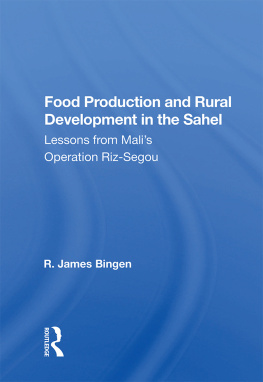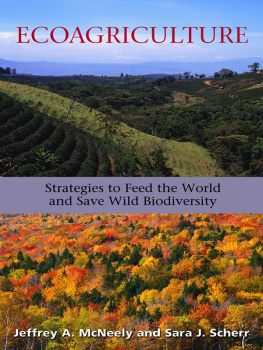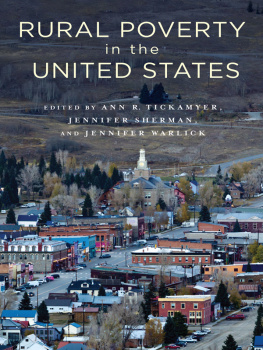Food Production and Rural Development in the Sahel
Westview Special Studies
The concept of Westview Special Studies is a response to the continuing crisis in academic and informational publishing. Library budgets are being diverted from the purchase of books and used for data banks, computers, micromedia, and other methods of information retrieval, Interlibrary loan structures further reduce the edition sizes required to satisfy the needs of the scholarly community. Economic pressures on university presses and the few private scholarly publishing companies have greatly limited the capacity of the industry to properly serve the academic and research communities. As a result, many manuscripts dealing with important subjects, often representing the highest level of scholarship, are no longer economically viable publishing projectsor, if accepted for publication, are typically subject to lead times ranging from one to three years.
Westview Special Studies are our practical solution to the problem. As always, the selection criteria include the importance of the subject, the work's contribution to scholarship, and its insight, originality of thought, and excellence of exposition. We accept manuscripts in camera-ready form, typed, set, or word processed according to specifications laid out in our comprehensive manual, which contains straightforward instructions and sample pages. The responsibility for editing and proofreading lies with the author or sponsoring institution, but our editorial staff is always available to answer questions and provide guidance.
The result is a book printed on acid-free paper and bound in sturdy library-quality soft covers. We manufacture these books ourselves using equipment that does not require a lengthy make-ready process and that allows us to publish first editions of 300 to 1000 copies and to reprint even smaller quantities as needed. Thus, we can produce Special Studies quickly and can keep even very specialized books in print as long as there is a demand for them.
About the Book and Author
In Mali and throughout the Sahel, governments increasingly rely on parastatal organizations to overcome the problems of lagging food production and rural poverty. This book examines the political and economic consequences of the efforts of one organization, Operation Riz-Segou in Mali, to increase smallholder food and cash crop production. Drawing extensively on fieldwork in Mali, the author finds that significant investments in irrigation facilities, financed by foreign aid, have not reduced the smallholder's vulnerability to the risks posed by weather and uncertain flood levels of the Niger River. The extension system discourages smallholder investment for long-term agricultural development because of its preoccupation with supervision and administrative control. Moreover, the Operation engages in many popular rural development activitiesliteracy programs, farmer training, women's artisanal centersthat give the facade of grassroots participation but in reality do not provide villagers a critically needed voice in local program administration.
Comparing Operation Riz-Segou to similar parastatal agricultural development programs in the Sahel, Dr. Bingen discusses why only those policies deliberately designed and carefully implemented to share power with the majority of the people can lay the political and economic foundation required to overcome rural poverty and resolve the food crisis in the Sahel.
Dr. R. James Bingen is field project director of the Senegal Agricultural Research and Planning Project.
Food Production and Rural Development in the Sahel
Lesson from Malis Operation Riz-Segou
R. James Bingen
First published 1985 by Westview Press, Inc.
Published 2018 by Routledge
52 Vanderbilt Avenue, New York, NY 10017
2 Park Square, Milton Park, Abingdon, Oxon OX14 4RN
Routledge is an imprint of the Taylor & Francis Group, an informa business
Copyright 1985 Taylor & Francis
All rights reserved. No part of this book may be reprinted or reproduced or utilised in any form or by any electronic, mechanical, or other means, now known or hereafter invented, including photocopying and recording, or in any information storage or retrieval system, without permission in writing from the publishers.
Notice:
Product or corporate names may be trademarks or registered trademarks, and are used only for identification and explanation without intent to infringe.
Library of Congress Cataloging in Publication Data
Bingen, R. James.
Food production and rural development in the Sahel
(Westview special studies in social, political, and economic development)
1. Rice tradeMali. 2. Food supplyMali. 3. Rural
developmentMali. 4. Food supplySahelCase studies.
5. Rural developmentSahelCase studies. I. Title.
HD9066.M352B56 1985 338.1'7318'096623 884-15226
ISBN 13: 978-0-367-02001-9 (hbk)
To Linda, Melissa and Peter
The research for this study was undertaken in Mali over a 15-month period, from July 1975 to October 1976. The primary data sources include structured interviews with graduates of Mali's farmer training centers (and with some of their peers who did not attend the centers), with the field-level extension staff ( Moniteurs and Encadreurs ) of Operation Riz-Segou, and with teachers and students in the Operation's Functional Literacy Program. Information was also collected on the social and economic characteristics of villages that participated in the Operation's Functional Literacy and Community Development Program. Files, records, and reports kept by the Operation were used to obtain information on land distribution, equipment ownership and purchases by smallholders, the size and composition of rice producers' holdings, and on the Operation's water supply, crop production, and marketing record. Information concerning Mali's system of training professional agricultural and government personnel was obtained from the Operation's personnel files as well as from records kept by the Agriculture Service in the Ministry of Rural Development. Diverse and uncatalogued regional and national agriculture service reports from the colonial period through the early 1970s were also consulted.
distinguishes the major features of agricultural development policy in Mali during three periods, 1960-1968, 1970-1973, and 1974-1980, and identifies and assesses the continuities and consequences of agricultural policies and programs during each time period.
reviews the establishment, financing, and major responsibilities of Operation Riz-Segou. A brief history of post-World War II planning and management for the development of rice production is given. The administrative structure, functional responsibilities, and public financing of Operation Riz-Segou are also presented in order to identify and assess the extent to which the principal institutional associations of the Operation at the international, national, and local levels affect the Operation's ability to promote rural development.
assesses the political and economic effects of the Operation's control over land and water in smallholder rice production. The principal issue examined is the effect of State control over land and water on rice production and rural welfare.
In , the Operation's delivery of a rice production package to smallholders is evaluated. The chapter begins with an analysis of the Operation's extension, or encadrement program, followed by a description of the improved technical package that the Operation's agents, or encadreurs , are asked to deliver to smallholders. How and to what extent the smallholders adopted the proposed recommendations is discussed as well as the role that technical agricultural agents play in influencing the structure of power in rural development.







